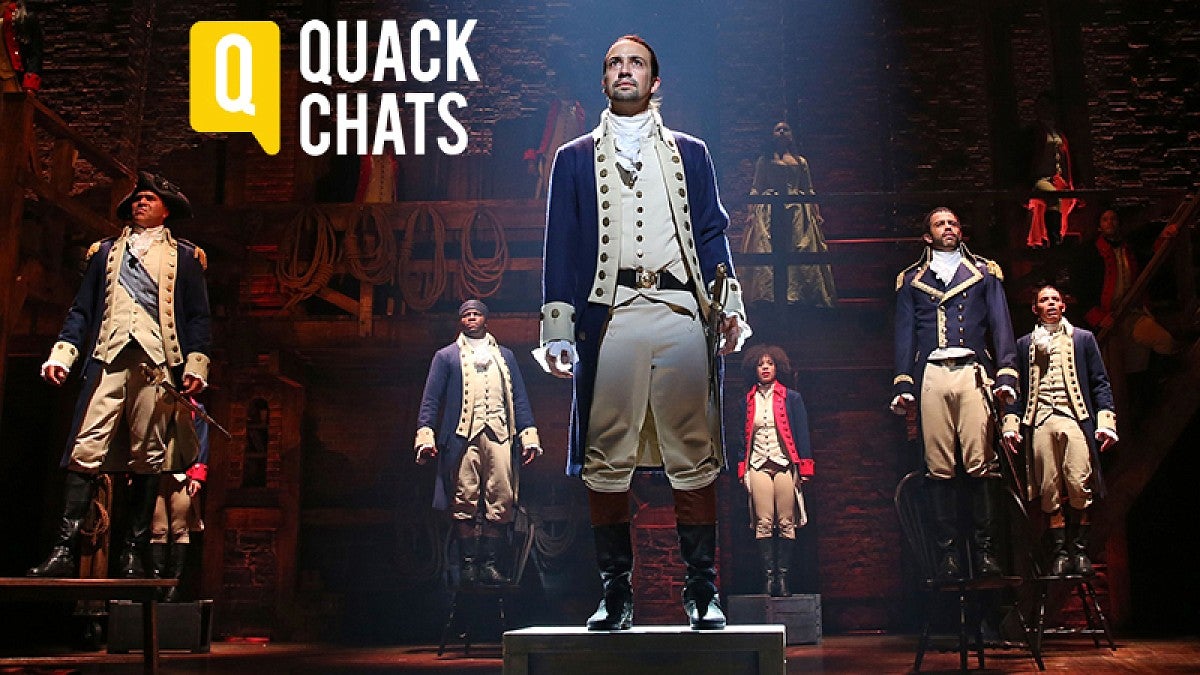The hit Broadway musical “Hamilton” gets praise for its focus on diversity and inclusion, but UO musicologist Loren Kajikawa cautions fans to hold their applause — at least some of it.
Kajikawa credits the musical with drawing attention to racism by retelling the story of the nation’s founders through marginalized groups, but he argues that its narrative overlooks an economic inequality that continues to limit many Americans. Kajikawa will address this discrepancy in his upcoming Quack Chats pub talk, “Listening to Hamilton in the Age of Trump,” at 6 p.m. Wednesday, March 8, in the Erb Memorial Union’s Falling Sky Pizzeria.
“‘Hamilton’ takes brilliant aim at our racist past, but it mostly gives a free pass to the dark economic forces that have bound race and capitalism from the colonial period onward,” said Kajikawa, who specializes in hip-hop and rap music and matters of racial representation.
“Hamilton” incorporates many components of Kajikawa’s academic expertise as it tells the story of Alexander Hamilton with a diverse cast and a hip-hop-based score.
“Its focus on racial diversity without concern for economic justice reflects current tensions in politics and in popular culture,” he said.
Kajikawa appreciates “Hamilton” for advocating for racial justice, but he points to the show’s portrayal of its title character as a clear example of the disconnect between racial and economic issues. He argues that the show heralds Hamilton as a champion of the people, without addressing the first U.S. secretary of the treasury’s role as the chief architect of Wall Street, which helped fund the expansion of slavery and enabled many of the nation’s wealthiest 1 percent to rise to affluence.
Kajikawa will also dive into the show’s integration of hip-hop and how it and the hip-hop culture plays out in the show.
“The show’s creator, Lin Manuel Miranda, borrowed a story from hip-hop — of struggle and perseverance and overcoming odds — and found the ways those elements are mirrored in the story of one of our Founding Fathers,” Kajikawa explained.
Kajikawa jokes that as someone who specializes in both hip-hop music and race, he had very little choice but to add his voice to those providing commentary on “Hamilton.” But when he started listening to the show’s music, he found himself an unexpected “super fan.” His entire family soon adopted his enthusiasm for the score, which he said is a rarity with his household’s musical preferences.
The event is open to the public, and participants are encouraged to ask questions and engage in a conversation with the researcher during the presentation. The talk is part of a series of events that fall under the umbrella of Quack Chats, a public outreach initiative led by University Communications.
And don’t forget the March 22 Quack Chat, “Fractals In Nature, Art and Human Vision,” with UO physicist Richard Taylor. Taylor is using his research on fractal patterns in nature to try to develop a retinal implant for the blind.
Then on Wednesday, April 5, the Museum of Natural and Cultural History will present its monthly pub talk, beginning at 6 p.m. at Marketplace@Sprout!, 418 A St., in Springfield. UO philosopher Erin McKenna will discuss “Living with Livestock.” McKenna will explore the interconnections and consider how to develop respectful relationships with these vital creatures.
To find other opportunities to attend UO events open to the public, see the university's Events Calendar.


